International Business Transactions and Law: A Contract Case Study
VerifiedAdded on 2023/06/13
|8
|1894
|83
Case Study
AI Summary
This case study analyzes an international business transaction involving the sale of wooden elephant statues between James in Sydney and Mr. Iwento in Kamaria. The core issues revolve around the formation of a valid contract under the United Nations Convention for the International Sale of Goods (CISG), specifically concerning offer, acceptance, and the implications of different incoterms (Delivery Duty Paid (DDP) vs. Free On Board (FOB)). James' counter-offer to accept the statues under DDP terms, Iwento's subsequent dispatch of goods, and the condition of the delivered statues (damaged and requiring insect treatment) are examined in light of CISG articles. The study concludes that a valid contract exists under DDP terms due to Iwento's performance, and that Iwento is liable for breach of contract due to the damaged condition of the goods and failure to meet DDP obligations, entitling James to claim damages including import duties and costs associated with the spoiled statues.
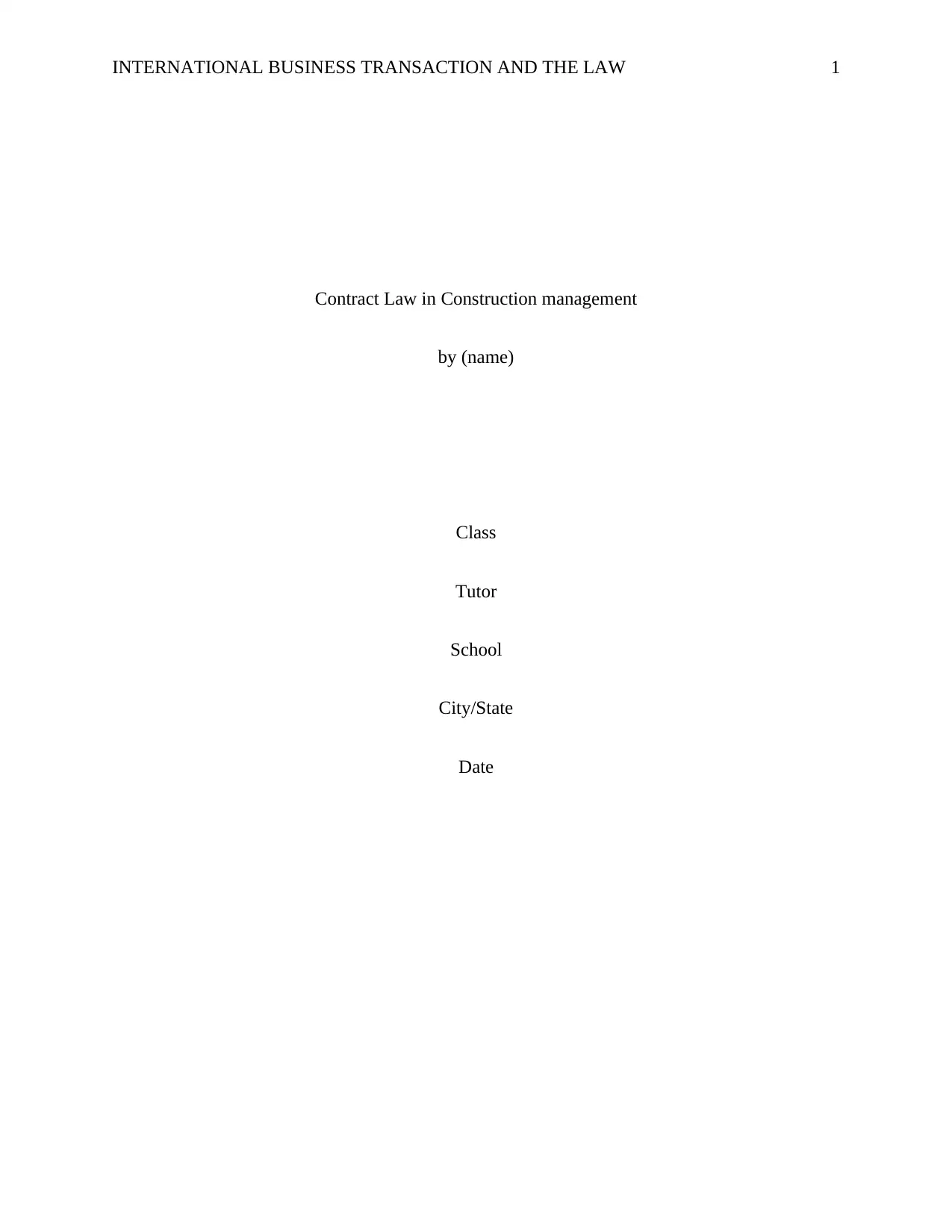
INTERNATIONAL BUSINESS TRANSACTION AND THE LAW 1
Contract Law in Construction management
by (name)
Class
Tutor
School
City/State
Date
Contract Law in Construction management
by (name)
Class
Tutor
School
City/State
Date
Paraphrase This Document
Need a fresh take? Get an instant paraphrase of this document with our AI Paraphraser
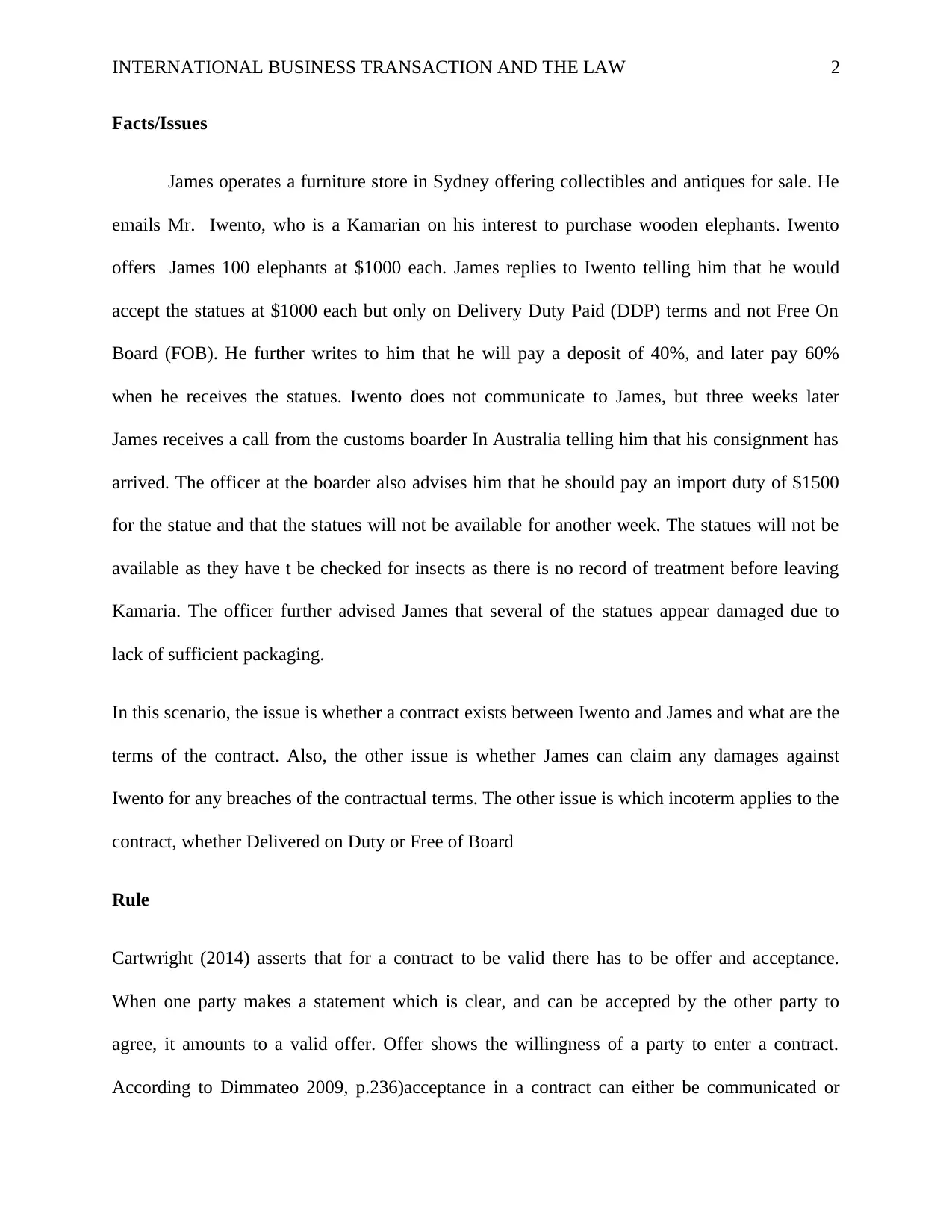
INTERNATIONAL BUSINESS TRANSACTION AND THE LAW 2
Facts/Issues
James operates a furniture store in Sydney offering collectibles and antiques for sale. He
emails Mr. Iwento, who is a Kamarian on his interest to purchase wooden elephants. Iwento
offers James 100 elephants at $1000 each. James replies to Iwento telling him that he would
accept the statues at $1000 each but only on Delivery Duty Paid (DDP) terms and not Free On
Board (FOB). He further writes to him that he will pay a deposit of 40%, and later pay 60%
when he receives the statues. Iwento does not communicate to James, but three weeks later
James receives a call from the customs boarder In Australia telling him that his consignment has
arrived. The officer at the boarder also advises him that he should pay an import duty of $1500
for the statue and that the statues will not be available for another week. The statues will not be
available as they have t be checked for insects as there is no record of treatment before leaving
Kamaria. The officer further advised James that several of the statues appear damaged due to
lack of sufficient packaging.
In this scenario, the issue is whether a contract exists between Iwento and James and what are the
terms of the contract. Also, the other issue is whether James can claim any damages against
Iwento for any breaches of the contractual terms. The other issue is which incoterm applies to the
contract, whether Delivered on Duty or Free of Board
Rule
Cartwright (2014) asserts that for a contract to be valid there has to be offer and acceptance.
When one party makes a statement which is clear, and can be accepted by the other party to
agree, it amounts to a valid offer. Offer shows the willingness of a party to enter a contract.
According to Dimmateo 2009, p.236)acceptance in a contract can either be communicated or
Facts/Issues
James operates a furniture store in Sydney offering collectibles and antiques for sale. He
emails Mr. Iwento, who is a Kamarian on his interest to purchase wooden elephants. Iwento
offers James 100 elephants at $1000 each. James replies to Iwento telling him that he would
accept the statues at $1000 each but only on Delivery Duty Paid (DDP) terms and not Free On
Board (FOB). He further writes to him that he will pay a deposit of 40%, and later pay 60%
when he receives the statues. Iwento does not communicate to James, but three weeks later
James receives a call from the customs boarder In Australia telling him that his consignment has
arrived. The officer at the boarder also advises him that he should pay an import duty of $1500
for the statue and that the statues will not be available for another week. The statues will not be
available as they have t be checked for insects as there is no record of treatment before leaving
Kamaria. The officer further advised James that several of the statues appear damaged due to
lack of sufficient packaging.
In this scenario, the issue is whether a contract exists between Iwento and James and what are the
terms of the contract. Also, the other issue is whether James can claim any damages against
Iwento for any breaches of the contractual terms. The other issue is which incoterm applies to the
contract, whether Delivered on Duty or Free of Board
Rule
Cartwright (2014) asserts that for a contract to be valid there has to be offer and acceptance.
When one party makes a statement which is clear, and can be accepted by the other party to
agree, it amounts to a valid offer. Offer shows the willingness of a party to enter a contract.
According to Dimmateo 2009, p.236)acceptance in a contract can either be communicated or
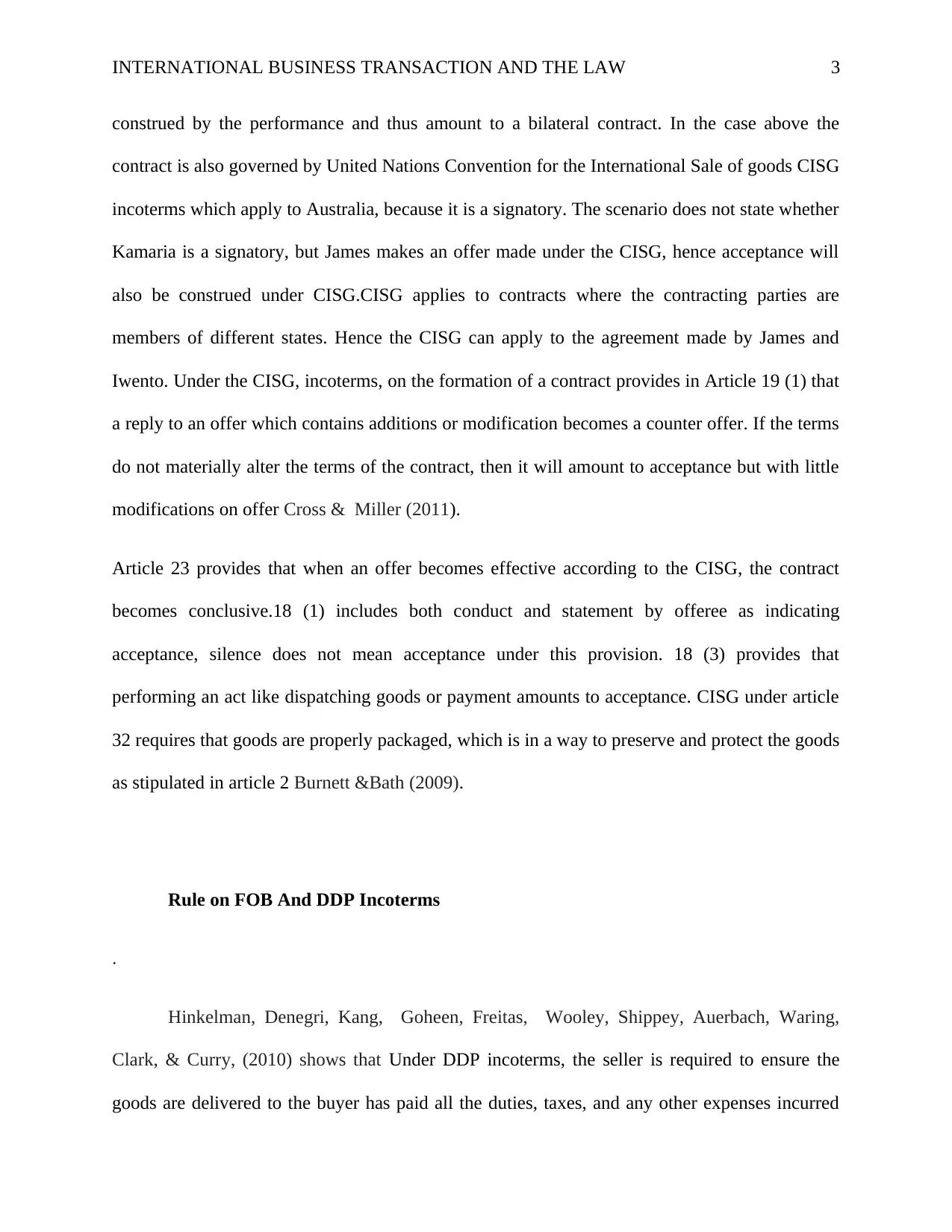
INTERNATIONAL BUSINESS TRANSACTION AND THE LAW 3
construed by the performance and thus amount to a bilateral contract. In the case above the
contract is also governed by United Nations Convention for the International Sale of goods CISG
incoterms which apply to Australia, because it is a signatory. The scenario does not state whether
Kamaria is a signatory, but James makes an offer made under the CISG, hence acceptance will
also be construed under CISG.CISG applies to contracts where the contracting parties are
members of different states. Hence the CISG can apply to the agreement made by James and
Iwento. Under the CISG, incoterms, on the formation of a contract provides in Article 19 (1) that
a reply to an offer which contains additions or modification becomes a counter offer. If the terms
do not materially alter the terms of the contract, then it will amount to acceptance but with little
modifications on offer Cross & Miller (2011).
Article 23 provides that when an offer becomes effective according to the CISG, the contract
becomes conclusive.18 (1) includes both conduct and statement by offeree as indicating
acceptance, silence does not mean acceptance under this provision. 18 (3) provides that
performing an act like dispatching goods or payment amounts to acceptance. CISG under article
32 requires that goods are properly packaged, which is in a way to preserve and protect the goods
as stipulated in article 2 Burnett &Bath (2009).
Rule on FOB And DDP Incoterms
.
Hinkelman, Denegri, Kang, Goheen, Freitas, Wooley, Shippey, Auerbach, Waring,
Clark, & Curry, (2010) shows that Under DDP incoterms, the seller is required to ensure the
goods are delivered to the buyer has paid all the duties, taxes, and any other expenses incurred
construed by the performance and thus amount to a bilateral contract. In the case above the
contract is also governed by United Nations Convention for the International Sale of goods CISG
incoterms which apply to Australia, because it is a signatory. The scenario does not state whether
Kamaria is a signatory, but James makes an offer made under the CISG, hence acceptance will
also be construed under CISG.CISG applies to contracts where the contracting parties are
members of different states. Hence the CISG can apply to the agreement made by James and
Iwento. Under the CISG, incoterms, on the formation of a contract provides in Article 19 (1) that
a reply to an offer which contains additions or modification becomes a counter offer. If the terms
do not materially alter the terms of the contract, then it will amount to acceptance but with little
modifications on offer Cross & Miller (2011).
Article 23 provides that when an offer becomes effective according to the CISG, the contract
becomes conclusive.18 (1) includes both conduct and statement by offeree as indicating
acceptance, silence does not mean acceptance under this provision. 18 (3) provides that
performing an act like dispatching goods or payment amounts to acceptance. CISG under article
32 requires that goods are properly packaged, which is in a way to preserve and protect the goods
as stipulated in article 2 Burnett &Bath (2009).
Rule on FOB And DDP Incoterms
.
Hinkelman, Denegri, Kang, Goheen, Freitas, Wooley, Shippey, Auerbach, Waring,
Clark, & Curry, (2010) shows that Under DDP incoterms, the seller is required to ensure the
goods are delivered to the buyer has paid all the duties, taxes, and any other expenses incurred
⊘ This is a preview!⊘
Do you want full access?
Subscribe today to unlock all pages.

Trusted by 1+ million students worldwide
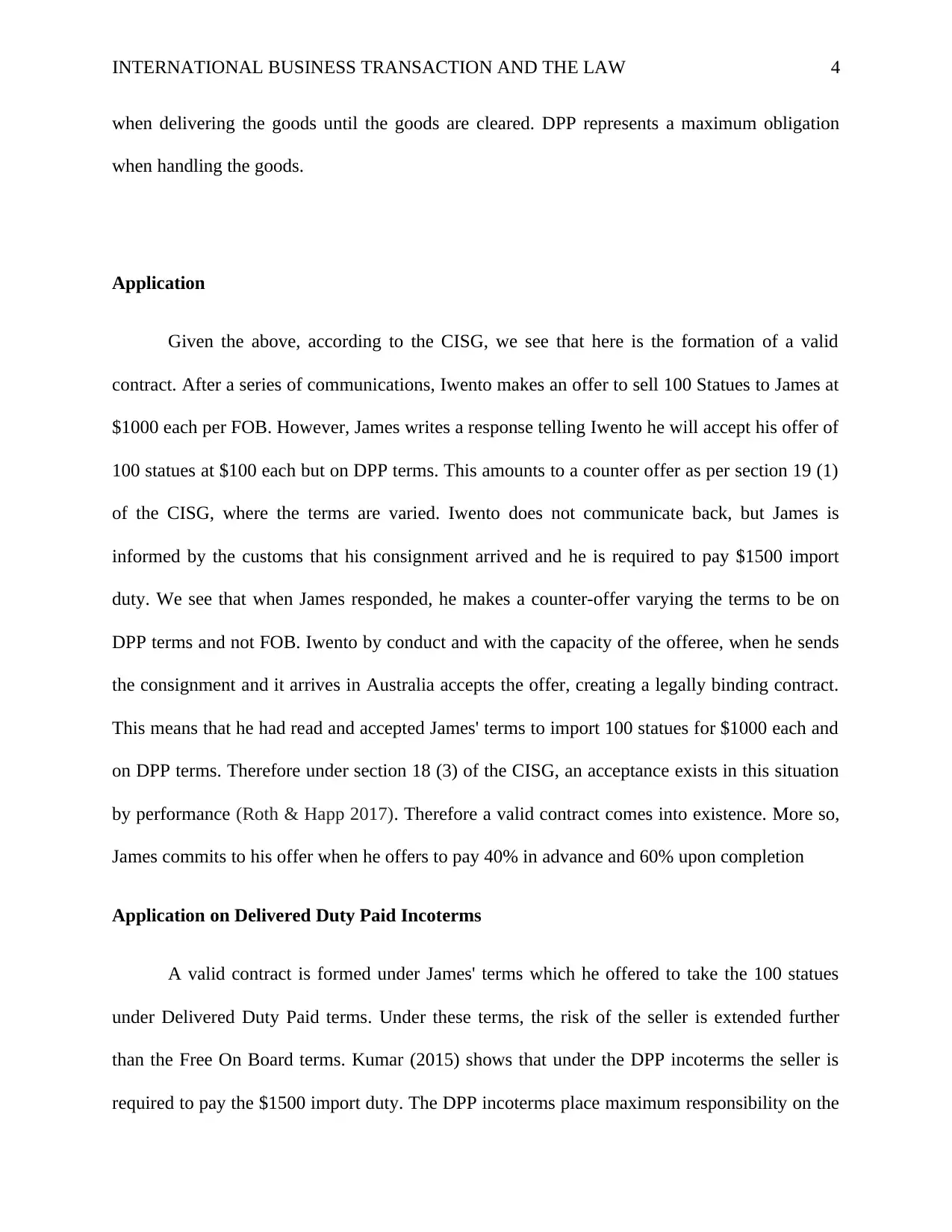
INTERNATIONAL BUSINESS TRANSACTION AND THE LAW 4
when delivering the goods until the goods are cleared. DPP represents a maximum obligation
when handling the goods.
Application
Given the above, according to the CISG, we see that here is the formation of a valid
contract. After a series of communications, Iwento makes an offer to sell 100 Statues to James at
$1000 each per FOB. However, James writes a response telling Iwento he will accept his offer of
100 statues at $100 each but on DPP terms. This amounts to a counter offer as per section 19 (1)
of the CISG, where the terms are varied. Iwento does not communicate back, but James is
informed by the customs that his consignment arrived and he is required to pay $1500 import
duty. We see that when James responded, he makes a counter-offer varying the terms to be on
DPP terms and not FOB. Iwento by conduct and with the capacity of the offeree, when he sends
the consignment and it arrives in Australia accepts the offer, creating a legally binding contract.
This means that he had read and accepted James' terms to import 100 statues for $1000 each and
on DPP terms. Therefore under section 18 (3) of the CISG, an acceptance exists in this situation
by performance (Roth & Happ 2017). Therefore a valid contract comes into existence. More so,
James commits to his offer when he offers to pay 40% in advance and 60% upon completion
Application on Delivered Duty Paid Incoterms
A valid contract is formed under James' terms which he offered to take the 100 statues
under Delivered Duty Paid terms. Under these terms, the risk of the seller is extended further
than the Free On Board terms. Kumar (2015) shows that under the DPP incoterms the seller is
required to pay the $1500 import duty. The DPP incoterms place maximum responsibility on the
when delivering the goods until the goods are cleared. DPP represents a maximum obligation
when handling the goods.
Application
Given the above, according to the CISG, we see that here is the formation of a valid
contract. After a series of communications, Iwento makes an offer to sell 100 Statues to James at
$1000 each per FOB. However, James writes a response telling Iwento he will accept his offer of
100 statues at $100 each but on DPP terms. This amounts to a counter offer as per section 19 (1)
of the CISG, where the terms are varied. Iwento does not communicate back, but James is
informed by the customs that his consignment arrived and he is required to pay $1500 import
duty. We see that when James responded, he makes a counter-offer varying the terms to be on
DPP terms and not FOB. Iwento by conduct and with the capacity of the offeree, when he sends
the consignment and it arrives in Australia accepts the offer, creating a legally binding contract.
This means that he had read and accepted James' terms to import 100 statues for $1000 each and
on DPP terms. Therefore under section 18 (3) of the CISG, an acceptance exists in this situation
by performance (Roth & Happ 2017). Therefore a valid contract comes into existence. More so,
James commits to his offer when he offers to pay 40% in advance and 60% upon completion
Application on Delivered Duty Paid Incoterms
A valid contract is formed under James' terms which he offered to take the 100 statues
under Delivered Duty Paid terms. Under these terms, the risk of the seller is extended further
than the Free On Board terms. Kumar (2015) shows that under the DPP incoterms the seller is
required to pay the $1500 import duty. The DPP incoterms place maximum responsibility on the
Paraphrase This Document
Need a fresh take? Get an instant paraphrase of this document with our AI Paraphraser
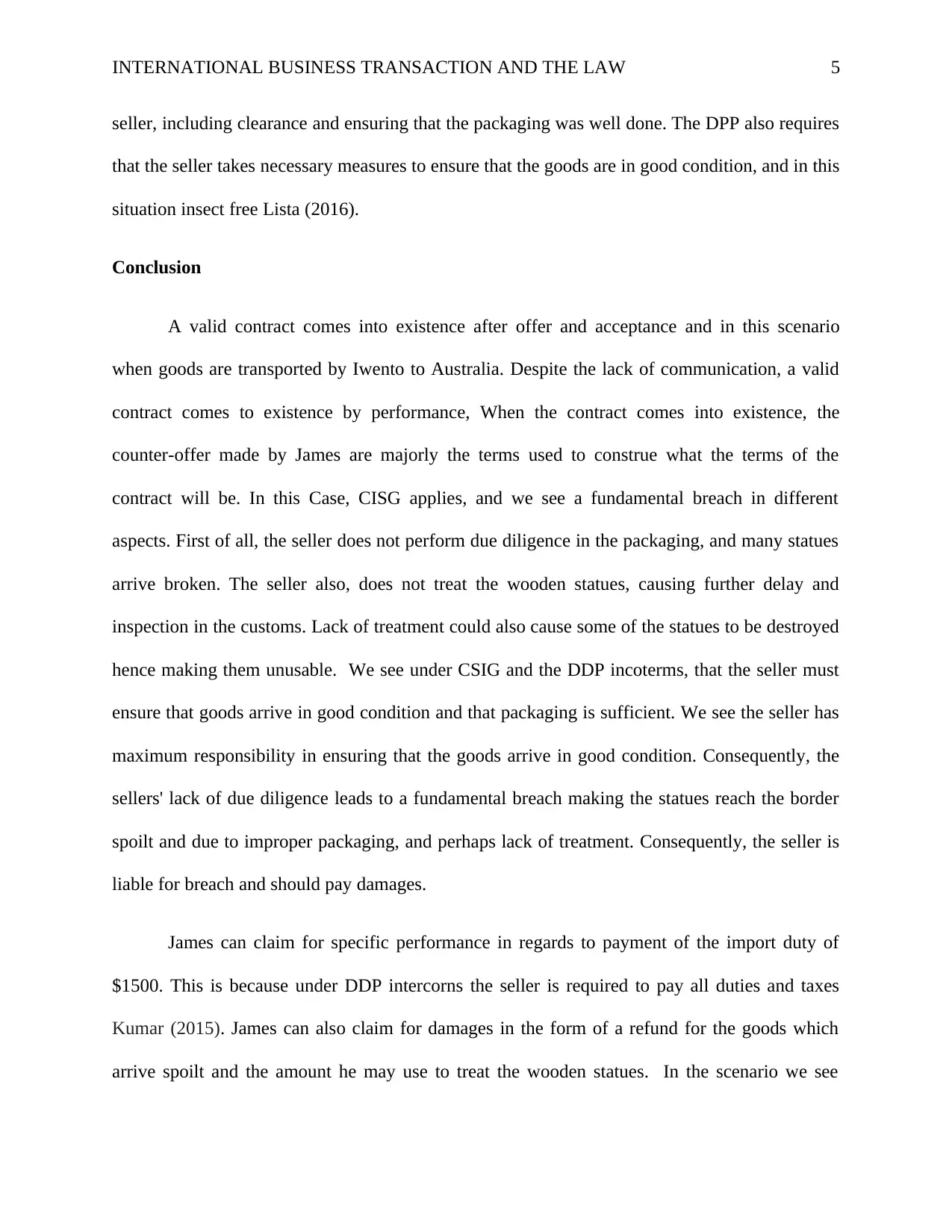
INTERNATIONAL BUSINESS TRANSACTION AND THE LAW 5
seller, including clearance and ensuring that the packaging was well done. The DPP also requires
that the seller takes necessary measures to ensure that the goods are in good condition, and in this
situation insect free Lista (2016).
Conclusion
A valid contract comes into existence after offer and acceptance and in this scenario
when goods are transported by Iwento to Australia. Despite the lack of communication, a valid
contract comes to existence by performance, When the contract comes into existence, the
counter-offer made by James are majorly the terms used to construe what the terms of the
contract will be. In this Case, CISG applies, and we see a fundamental breach in different
aspects. First of all, the seller does not perform due diligence in the packaging, and many statues
arrive broken. The seller also, does not treat the wooden statues, causing further delay and
inspection in the customs. Lack of treatment could also cause some of the statues to be destroyed
hence making them unusable. We see under CSIG and the DDP incoterms, that the seller must
ensure that goods arrive in good condition and that packaging is sufficient. We see the seller has
maximum responsibility in ensuring that the goods arrive in good condition. Consequently, the
sellers' lack of due diligence leads to a fundamental breach making the statues reach the border
spoilt and due to improper packaging, and perhaps lack of treatment. Consequently, the seller is
liable for breach and should pay damages.
James can claim for specific performance in regards to payment of the import duty of
$1500. This is because under DDP intercorns the seller is required to pay all duties and taxes
Kumar (2015). James can also claim for damages in the form of a refund for the goods which
arrive spoilt and the amount he may use to treat the wooden statues. In the scenario we see
seller, including clearance and ensuring that the packaging was well done. The DPP also requires
that the seller takes necessary measures to ensure that the goods are in good condition, and in this
situation insect free Lista (2016).
Conclusion
A valid contract comes into existence after offer and acceptance and in this scenario
when goods are transported by Iwento to Australia. Despite the lack of communication, a valid
contract comes to existence by performance, When the contract comes into existence, the
counter-offer made by James are majorly the terms used to construe what the terms of the
contract will be. In this Case, CISG applies, and we see a fundamental breach in different
aspects. First of all, the seller does not perform due diligence in the packaging, and many statues
arrive broken. The seller also, does not treat the wooden statues, causing further delay and
inspection in the customs. Lack of treatment could also cause some of the statues to be destroyed
hence making them unusable. We see under CSIG and the DDP incoterms, that the seller must
ensure that goods arrive in good condition and that packaging is sufficient. We see the seller has
maximum responsibility in ensuring that the goods arrive in good condition. Consequently, the
sellers' lack of due diligence leads to a fundamental breach making the statues reach the border
spoilt and due to improper packaging, and perhaps lack of treatment. Consequently, the seller is
liable for breach and should pay damages.
James can claim for specific performance in regards to payment of the import duty of
$1500. This is because under DDP intercorns the seller is required to pay all duties and taxes
Kumar (2015). James can also claim for damages in the form of a refund for the goods which
arrive spoilt and the amount he may use to treat the wooden statues. In the scenario we see
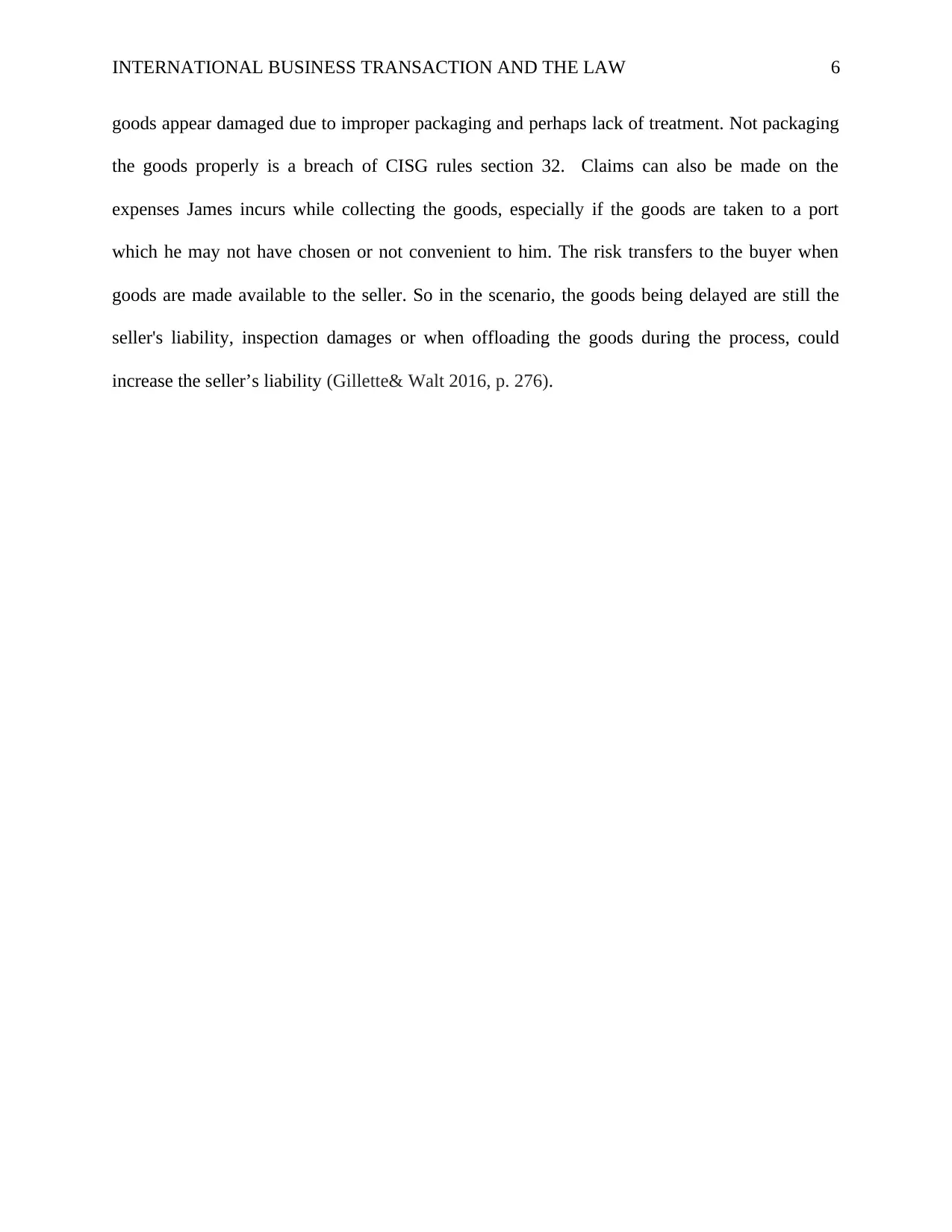
INTERNATIONAL BUSINESS TRANSACTION AND THE LAW 6
goods appear damaged due to improper packaging and perhaps lack of treatment. Not packaging
the goods properly is a breach of CISG rules section 32. Claims can also be made on the
expenses James incurs while collecting the goods, especially if the goods are taken to a port
which he may not have chosen or not convenient to him. The risk transfers to the buyer when
goods are made available to the seller. So in the scenario, the goods being delayed are still the
seller's liability, inspection damages or when offloading the goods during the process, could
increase the seller’s liability (Gillette& Walt 2016, p. 276).
goods appear damaged due to improper packaging and perhaps lack of treatment. Not packaging
the goods properly is a breach of CISG rules section 32. Claims can also be made on the
expenses James incurs while collecting the goods, especially if the goods are taken to a port
which he may not have chosen or not convenient to him. The risk transfers to the buyer when
goods are made available to the seller. So in the scenario, the goods being delayed are still the
seller's liability, inspection damages or when offloading the goods during the process, could
increase the seller’s liability (Gillette& Walt 2016, p. 276).
⊘ This is a preview!⊘
Do you want full access?
Subscribe today to unlock all pages.

Trusted by 1+ million students worldwide
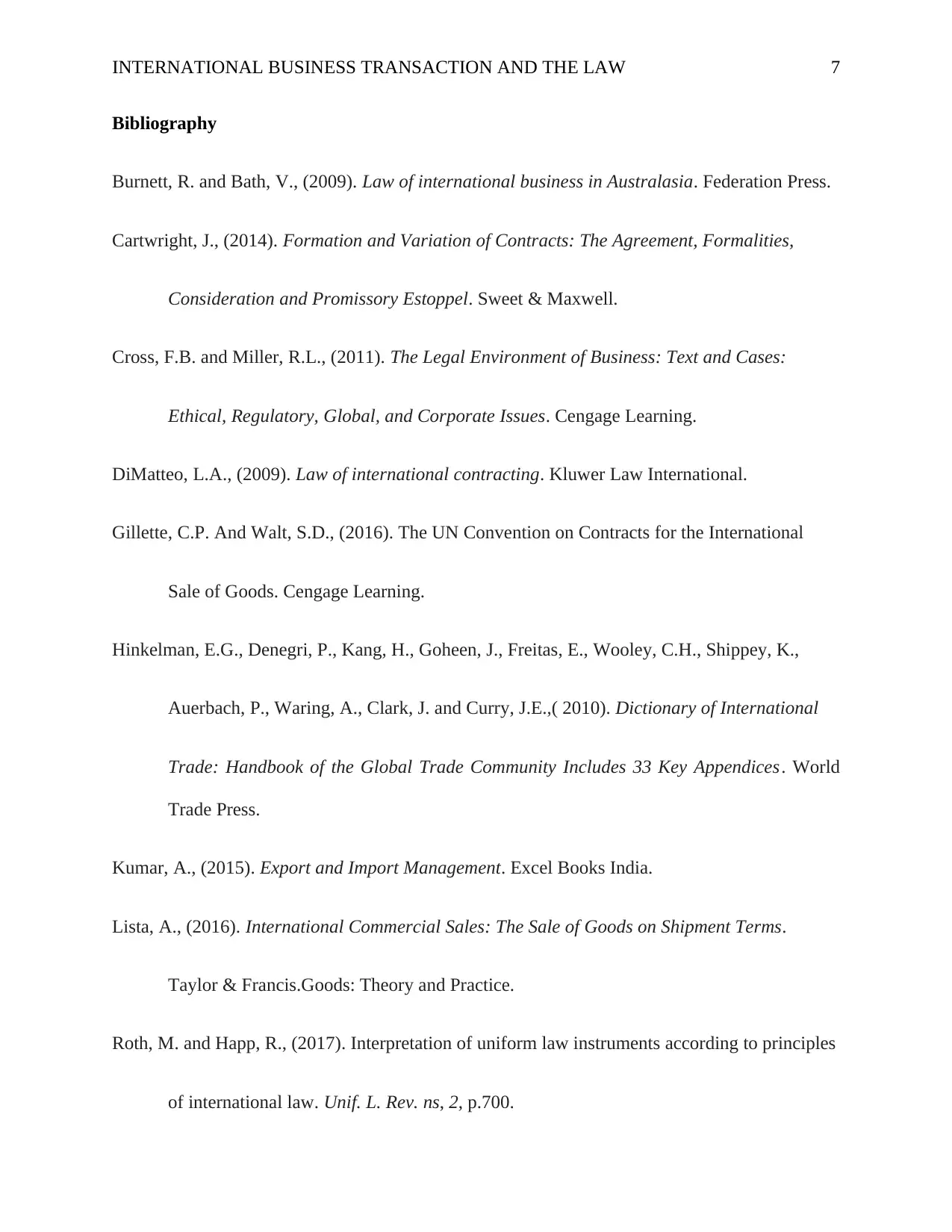
INTERNATIONAL BUSINESS TRANSACTION AND THE LAW 7
Bibliography
Burnett, R. and Bath, V., (2009). Law of international business in Australasia. Federation Press.
Cartwright, J., (2014). Formation and Variation of Contracts: The Agreement, Formalities,
Consideration and Promissory Estoppel. Sweet & Maxwell.
Cross, F.B. and Miller, R.L., (2011). The Legal Environment of Business: Text and Cases:
Ethical, Regulatory, Global, and Corporate Issues. Cengage Learning.
DiMatteo, L.A., (2009). Law of international contracting. Kluwer Law International.
Gillette, C.P. And Walt, S.D., (2016). The UN Convention on Contracts for the International
Sale of Goods. Cengage Learning.
Hinkelman, E.G., Denegri, P., Kang, H., Goheen, J., Freitas, E., Wooley, C.H., Shippey, K.,
Auerbach, P., Waring, A., Clark, J. and Curry, J.E.,( 2010). Dictionary of International
Trade: Handbook of the Global Trade Community Includes 33 Key Appendices. World
Trade Press.
Kumar, A., (2015). Export and Import Management. Excel Books India.
Lista, A., (2016). International Commercial Sales: The Sale of Goods on Shipment Terms.
Taylor & Francis.Goods: Theory and Practice.
Roth, M. and Happ, R., (2017). Interpretation of uniform law instruments according to principles
of international law. Unif. L. Rev. ns, 2, p.700.
Bibliography
Burnett, R. and Bath, V., (2009). Law of international business in Australasia. Federation Press.
Cartwright, J., (2014). Formation and Variation of Contracts: The Agreement, Formalities,
Consideration and Promissory Estoppel. Sweet & Maxwell.
Cross, F.B. and Miller, R.L., (2011). The Legal Environment of Business: Text and Cases:
Ethical, Regulatory, Global, and Corporate Issues. Cengage Learning.
DiMatteo, L.A., (2009). Law of international contracting. Kluwer Law International.
Gillette, C.P. And Walt, S.D., (2016). The UN Convention on Contracts for the International
Sale of Goods. Cengage Learning.
Hinkelman, E.G., Denegri, P., Kang, H., Goheen, J., Freitas, E., Wooley, C.H., Shippey, K.,
Auerbach, P., Waring, A., Clark, J. and Curry, J.E.,( 2010). Dictionary of International
Trade: Handbook of the Global Trade Community Includes 33 Key Appendices. World
Trade Press.
Kumar, A., (2015). Export and Import Management. Excel Books India.
Lista, A., (2016). International Commercial Sales: The Sale of Goods on Shipment Terms.
Taylor & Francis.Goods: Theory and Practice.
Roth, M. and Happ, R., (2017). Interpretation of uniform law instruments according to principles
of international law. Unif. L. Rev. ns, 2, p.700.
Paraphrase This Document
Need a fresh take? Get an instant paraphrase of this document with our AI Paraphraser

INTERNATIONAL BUSINESS TRANSACTION AND THE LAW 8
Zeller, B., (2000). The UN Convention on Contracts for the International Sale of Goods (CISG)-
A Leap Forward towards Unified International Sales Law. Pace Int'l L. Rev., 12, p.79.
Zeller, B., (2000). The UN Convention on Contracts for the International Sale of Goods (CISG)-
A Leap Forward towards Unified International Sales Law. Pace Int'l L. Rev., 12, p.79.
1 out of 8
Related Documents
Your All-in-One AI-Powered Toolkit for Academic Success.
+13062052269
info@desklib.com
Available 24*7 on WhatsApp / Email
![[object Object]](/_next/static/media/star-bottom.7253800d.svg)
Unlock your academic potential
Copyright © 2020–2026 A2Z Services. All Rights Reserved. Developed and managed by ZUCOL.





